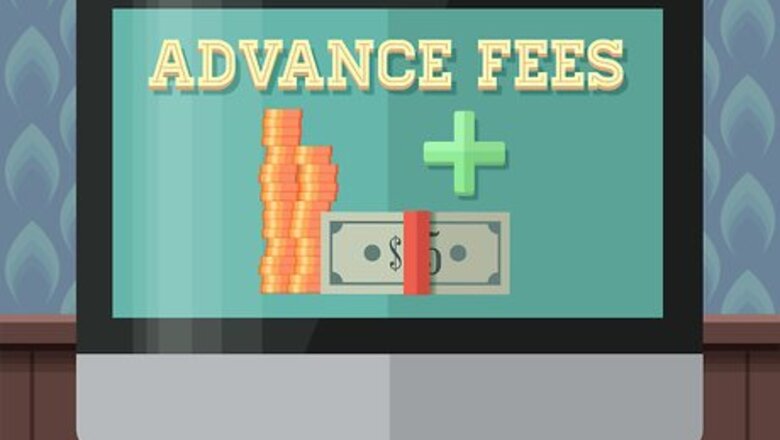
views
Identifying Common Internet Scams

Identify advance fee scams. This type of fraud asks that you send a certain amount of money to a person. In return, you will get something of value, such as a romantic relationship, financial reward, or other benefit. Advance fee scams are common on the Internet. They also share other features: They typically originate outside your country. For many years, these scams originated from Nigeria, though they now come from all over the world. The letter or email is printed on letterhead to look official. The person writing to you claims to be a government official, a prince, or some other person of importance.
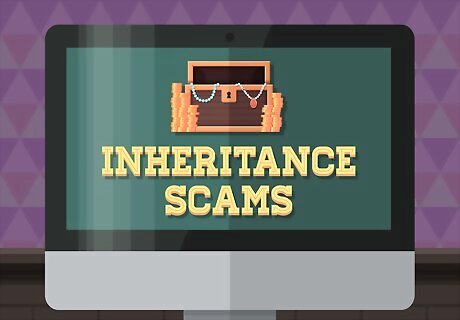
Identify inheritance scams. Be on the lookout for emails from lawyers claiming that one of your relatives has died overseas. The lawyer usually claims that this distant relative (who you never met) has left you a large sum of money in a bank account. In order to get the money, you have to pay a transfer fee, as well as the lawyer’s fees. Often the distant relative worked in the oil industry, though this detail could vary depending on the scam. The email or letter you receive is typically packed with information and very official looking. The lawyer often claims that he has searched for years to find a living relative, and that he is on the verge of giving up.
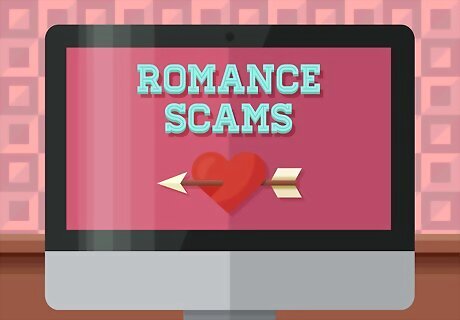
Avoid dating or romance scams. This type of scam has become increasingly popular. You meet someone on an internet dating site who lives in another country. This person often claims to be an American but is living overseas for some reason. After communicating with each other for several months, the other person claims that tragedy has suddenly struck and that they need money. For example, the person might claim that their child needs emergency surgery. You might even be contacted by someone claiming to be a doctor. Pay attention to the person’s English. The scammer is almost always a non-American, so you should be suspicious of misspellings and grammatical errors in this person’s communications. The person avoids ever meeting you in person. In fact, the tragedy often strikes when they are scheduled to hop on a plane and come meet you. The person might try to prove that they are a U.S. citizen by sending you a digitalized image of their passport. The picture in the passport often looks like a photo of a model.
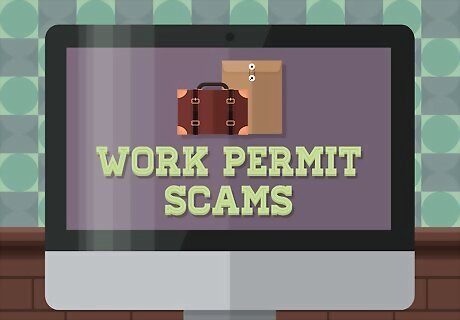
Identify work permit scams. This fraud consists of someone claiming to represent a large foreign corporation contacting you with an offer of employment. You are usually offered a huge salary—over $100,000 for less than a full years’ worth of work. The catch: you have to pay fees up-front. After paying the fees, you never hear back from the company. Work permit scams can involve offers of employment in many industries, though entertainers are now increasingly targeted.
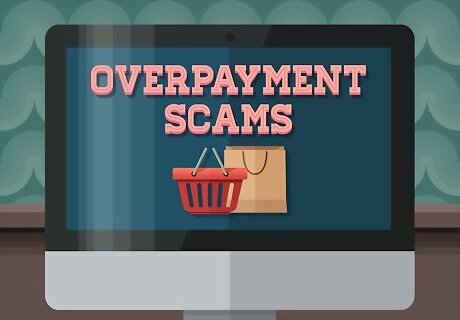
Watch out for “overpayment” schemes. This is a clever, complicated scheme which can catch people who sell goods online. For example, you sell items on e-Bay. The person who wins the auction then sends you a money order. However, the money order is for more than the amount they have to pay. They might send a money order for $600 when they only need to pay you $100. The buyer then requests that you refund the excess. In this scheme, the money order is fraudulent. Because your bank accepted the money order, you assume it is legitimate. You refund the excess to the buyer. A couple weeks later, your bank tells you that the money order itself was a fraud. You not only don’t have a buyer for your goods, you also have been scammed out of the money you “refunded.” There are many variations on this scheme. For example, someone might agree to be your roommate or to rent from you. They send a deposit for an amount larger than they owe. They then request a refund of the excess. You should be alert any time someone requests a refund because they overpaid.
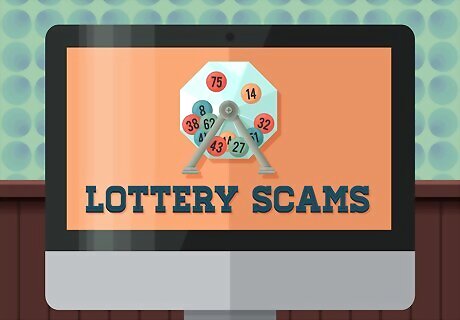
Identify lottery scams. This is an old standby. Someone emails you or sends you a letter claiming that you have won a lottery. All you need to do is send some money to pay up-front fees. Of course, the lottery is a fraud and the scammer makes off with the fee you paid. If you didn’t buy a lottery ticket, then you didn’t win a lottery. Also, legitimate lotteries don’t request that you pay advance fees. The notice usually contains awkward writing or grammatical errors, as if the author is not a native speaker of the language. Also these emails often come from free e-mail services, like Gmail or Yahoo.

Watch out for scams targeting grandparents. The elderly are often targets of international fraud. For example, someone might call them up claiming to be their grandchild. They say they have a cold, which is why they sound different. They then claim to have suffered some accident overseas and immediately need their grandparents to send them money by Western Union. Many of these scams originate in Quebec, which has a 514 area code. However, they can also come from anywhere. In a real emergency, your grandchildren should go to the nearest U.S. embassy in whatever country they are in. You can also contact your grandchildren’s parents to find out where your grandchild is.
Protecting Yourself from International Fraud

Date online carefully. It’s one thing to use an online dating service to meet people in your area. However, it’s quite a different thing to form relationships entirely online for several months. Use online dating websites to find people you want to meet in real life—and then schedule a date. Be very suspicious of anyone who wants to form a relationship entirely online and who gives excuses for why you can’t meet in person.
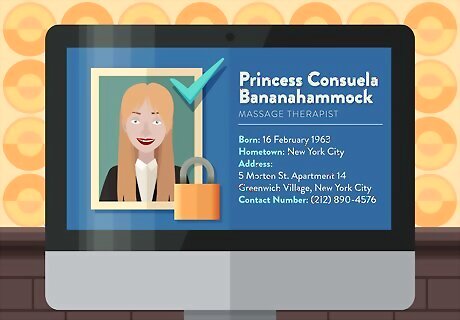
Be selective about what you reveal online. If you have social media accounts, then you should be careful about what you reveal. For example, you shouldn’t reveal that you are recently widowed. Often scammers target the elderly who are widowed because they believe that many of these people are lonely and could potentially have inherited sums of money.

Don’t send money to people you’ve never met. As a general rule, avoid sending money to anyone who contacts you first. Only send money to businesses or organizations that you have initiated contact with. If a person claims to be a U.S. citizen in distress overseas, then refer them to the U.S. embassy or consulate. A scammer might claim that the embassy won’t help them, but that is a lie. The embassy’s top priority is to help citizens overseas.
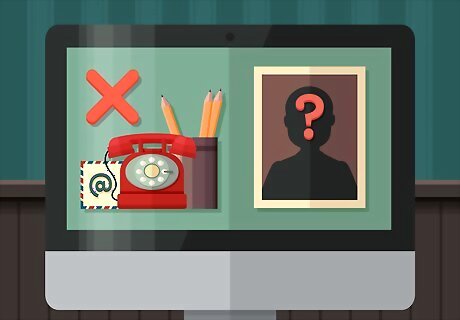
Cut off all contact with the fraudster. You shouldn’t respond to scammers. If you accidentally sent money, then you should also stop all contact. You are unlikely to talk someone into giving you the money back, so there is no reason to continue communicating with them. Instead, you should report fraud to the appropriate authorities.
Reporting International Fraud

Save the email or letter. You should always save proof of the scam. The authorities you contact might want to see the contents of any communication. Print out emails and save letters. Store them in a safe place. If you were contacted over the phone, write down the phone number that called you.
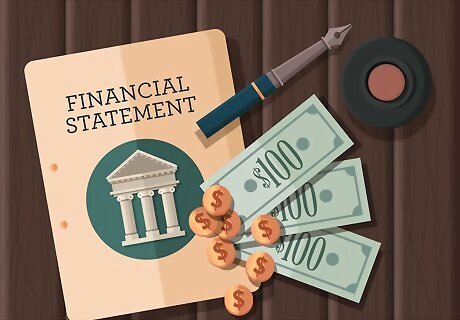
Preserve proof of any financial loss. You might have fallen victim to the scam. For example, you might have sent money to someone and never heard back. You should save evidence of your financial loss. For example, you can get cancelled checks, bank statements, or credit card statements. If you wired money to a fraudster, then save the wire receipt.
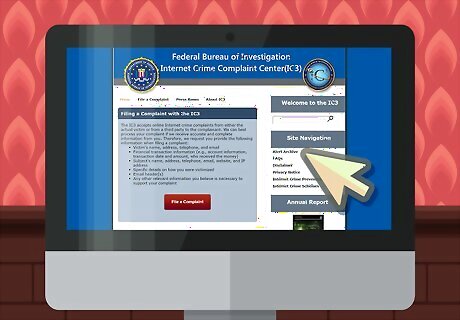
Contact the Internet Crime Complaint Center. This organization gathers complaints about online scams and then refers matters to the appropriate local, state, or federal office. You can file a complaint at the website. You will need to provide the following information: your name your mailing address your telephone number the name, address, phone number, and web address of the individual or organization running the scam details on why you believe this is a fraud any other relevant information

Contact the Secret Service if you have suffered a large financial loss. The Secret Service will analyze your case and decide whether to investigate. Decisions are made on a case-by-case basis. You can find your local Secret Service field office by visiting the Secret Service website and entering your address or zip code.
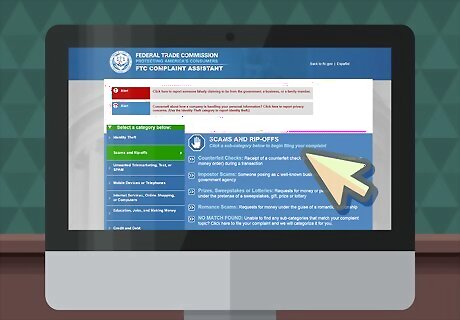
Report the fraud to the Federal Trade Commission (FTC). You can report Internet fraud to the FTC by calling 1-877-382-4357. You can also use the Complaint Assistant at the FTC website. At the website, click on “Scams and Rip-offs” and provide the requested information.

Call your local police. Other people in your area may also be victims of the scam. Accordingly, you should report the fraud by calling your local police, whose number you can find in the phone book.

Report the fraud to authorities overseas. You should also report the fraud to the appropriate government agency in the country where you think the fraud originates. You can report to the following country’s authorities: For scams originating in Nigeria, contact the Nigerian Economic and Financial Crimes Commission. For fraud originating from South Africa, contact INTERPOL—South African Police Service. You can call the office at +27 12 4070458 or +27 12 4070464. Alternately, you can send an email to [email protected] or [email protected]. For fraud from the U.K., you can call Metropolitan Police at +44-300-123-1212. For Canadian fraud, call 1-888-495-8501. For fraud which originates from other countries, you should call that country’s embassy. Alternately, you could call the State Department’s Office of Overseas Citizens Services, 1-888-407-4747.












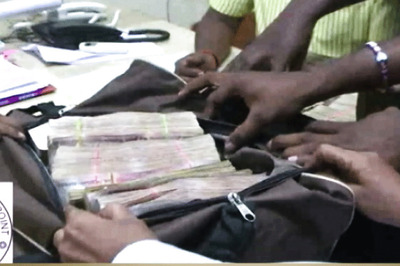







Comments
0 comment